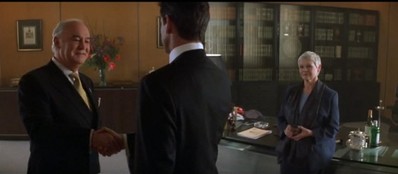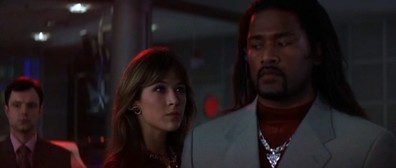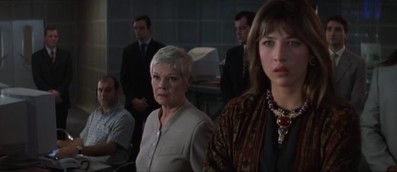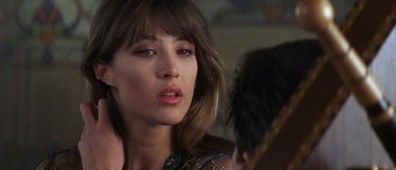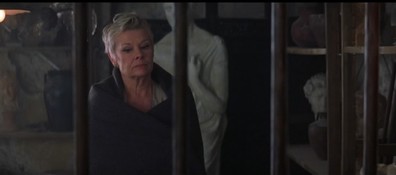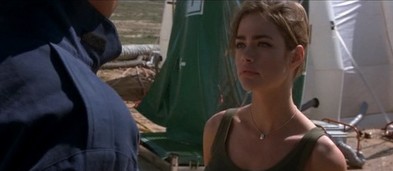Bond Girl: Re-Watching and Re-Evaluating The World is Not Enough
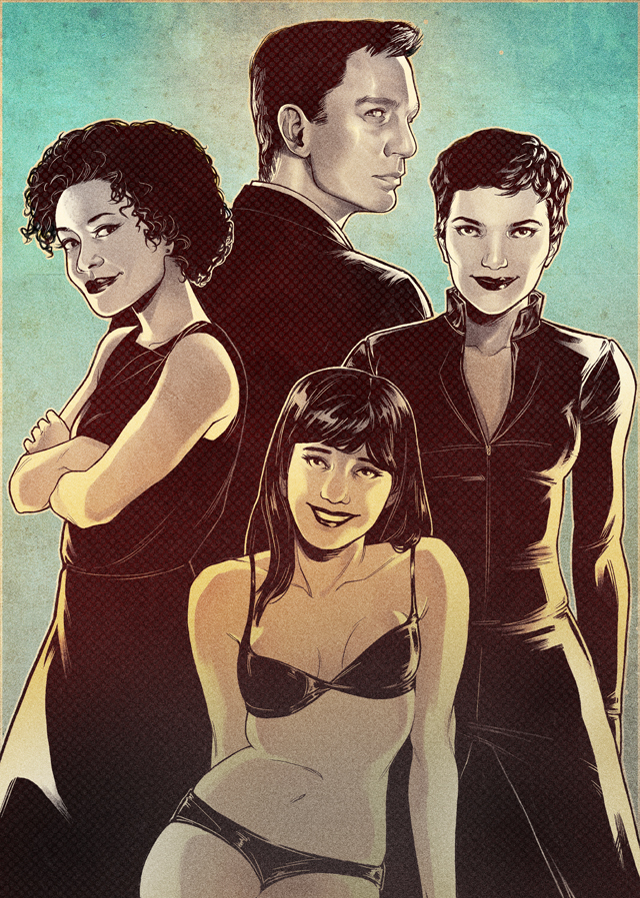
Original illustration by Emilie Majarian for The Mary Sue.
Welcome to Bond Girl, a series where we’ll be re-watching and re-evaluating every James Bond film until Spectre’s release.
Often, I’m hesitant to call action films subversive for how they treat women. For what they tear down or subvert in established tropes and stereotypes, they also tend to reinforce sexist standards in the next vein. But I’ve got to admit that The World Is Not Enough gets pretty close to getting it right.
The World Is Not Enough is the nineteenth film in the Eon Productions James Bond series and Pierce Brosnan’s third film in the role. Directed by Michael Apted and written under the combined efforts of Neal Purvis, Robert Wade, and Bruce Feirstein, this film revolves around the assassination of billionaire Robert King and Bond’s attempts to protect King’s daughter Elektra while attempting to stop the terrorist Renard from destroying everything.
On the surface, The World Is not Enough is your typical action film type. However, from the start of the film you can tell that things aren’t quite what they seem. People aren’t what they seem. Especially Elektra, the daughter of the murdered billionaire.
Now I know, usually I take a bit more time to talk about the plot and things that I didn’t like before I move on to talking about the women in the film, but you can’t talk about the plot without talking about Elektra (played by Sophie Marceau).
When you first look at her, Elektra seems like your standard Bond Girl. In the style of those that came before her, she seems delicate and fragile with a core of steel. I tend to compare her to Solitaire from Live and Let Die at first glance because they’re visually similar and ping Bond’s protective instincts in a major way. You look at Elektra like Bond does, assuming that because of the trauma that she’s supposed to face at Renard’s hands, that she’s one of the good guys—or at least a noncombatant to be protected.
For much of the film, Bond doesn’t look at Elektra as anything other than a victim or a maiden to be rescued. In fact, the first time that he sees her face on a screen, she’s slotted neatly into the victim role. In MI6 headquarters, Bond watches a video made of Elektra during a kidnapping situation. When she cries and a tear rolls down her cheek, Bond actually reaches out as if to wipe the tear away from her face.
It’s a sweet, sentimental moment but it sets up Bond’s views very well. Bond doesn’t see Elektra as a woman. On one hand, she’s M and MI6’s bait to catch Renard in the middle of his plot. On the other, she’s a girl and so very fragile.
However, the fragility is just a mask. Elektra has cultivated this personality that she shows to her adoring public of this sweet and generous young woman. She’s survived horrific treatment at the hands of a violent terrorist and yet she’s framed as mostly untouched. Elektra plays upon the image of womanhood that men (and some women) expect from her, the way that survivors of trauma are often infantilized by the people around them.
There’s this quote in my lovely Bond Girls book where Barbara Broccoli says of Elektra, that “Bond thinks he has found Tracy, but he’s really found Blofeld” and that makes all the sense in the world. She’s playing to his weaknesses, to his thoughts about what women are like and what they do.
Despite his experiences with dangerous women, Bond still falls into the trap.
Because Bond and MI6 expect her to be a certain way—easily-frightened and pliant—Elektra has more room to maneuver and to manipulate. Elektra is a hero and a victim. Some of the characters in the film see her as a saint (check out the scenes in Azerbaijan) and other see her as a child, but everyone underestimates her and misunderstands her process.
It’s really embarrassing how long it takes the characters to realize that Elektra is evil.
But I think that Elektra is absolutely fascinating as a character because the first time that you see the film, you think that she’s our Bond Girl. The World Is Not Enough is set up in such a way that you assume that Elektra is good and sweet and truly as innocent as she seems. Sure, she’s a bit suspicious when she’s supposed to be mourning her father while her eyes are dry, but you can chalk that up to shock or a delayed reaction. The scenes in Azerbaijan with the church and where she talks about respecting her late mother’s culture show her as a deeply sensitive woman.
When you look at the villains that came before her, Elektra doesn’t ping as one immediately. She’s small and slight. Even during the action scenes on the ski slope she doesn’t really possess power that’d make you second guess her motivation. From what we’re shown and what Bond sees, she’s not someone that seems capable of immense violence.
And of course, the film proves us wrong in a major way.
Despite appearances, Elektra is every inch a model Bond villain. Calculating, cold, with a passion that flares up at the worst times, her goal is to destroy Bond and make her mark on the world by any means necessary. But what makes her different also makes her interesting.
My major pet peeve with the Bond franchise is how women in the series aren’t always three-dimensional. Especially when they’re related to villains (either as minions or lovers), we never quite see them fleshed out. Often, they’re used as bait or distractions for Bond and wind up dead or discarded.
That’s not cool.
With Elektra, you get that role flipped on its head. MI6 and Bond are using Elektra as bait for Bond, but she’s using herself and the public perceptions about her personality as bait and a distraction for them. I just can’t get over that. She’s basically the perfect person to direct Bond off task. She’s recently suffered the loss of her father and she’s supposed to be in this vulnerable place. The films are still doing that thing where they mention Tracy Bond without really mentioning her so that James Bond can look sadly off into the distance while avoiding the question. It was like she crafted her personality so that she could ensnare Bond and MI6 while killing two birds with one stone.
At the heart of it, Elektra’s quest for revenge makes sense. We find out very early on that she’d been kidnapped by Renard prior to the start of the film. When her father was sent a ransom note, he went to MI6 and M who, despite her motherly instincts (their implication, not mine), told King not to pay the ransom.
Knowing that her father had the money to help her but didn’t pay the ransom shook something loose in Elektra. There’s this scene near the end of the film after Bond realizes that Elektra is using them all that gets us this intense bit of dialogue while Elektra tortures Bond:
James Bond: So you killed your father.
Elektra: He killed me! He killed me the day he refused to pay my ransom.
Elektra survived by seducing Renard (hurting herself in the process) and then started making her plans to end her father’s life from that moment. She blamed her father (of course) and M for not paying the ransom. Of course, we can assume that M would’ve probably sent an agent to rescue her, but Elektra didn’t wait long enough to find that out.
So not only do we get Elektra’s tragic backstory, but we also get a realistic one. It makes sense that she’d try and get revenge over the people that appear responsible for destroying her life. It’s a lot better than what we tended to get in terms of villains and it makes sense.
Elektra is a villain.
Not a henchman.
Not a conquest.
She’s a straight up villain to be counted among the likes of Goldfinger and Blofeld. She has henchmen, a lair, all of that good villainous tech. At first, it’s easy to assume that Renard is the main big-bad in the film but Elektra is a master of manipulation and has him wrapped around her little finger so tightly that he doesn’t even seem to realize it.
It’s amazing that a major theme of the film is Bond fighting to come to terms with a villain that he’s attracted and attached to. We got a little bit of this back with Alex Trevelyan but this is a different, more intense kind of intensity because while Bond’s feelings towards Trevelyan cool with his betrayal, he doesn’t know what to do about Elektra until there’s nothing else that he can do.
Aside from Elektra, The World Is Not Enough is also notable for the women on Bond’s side of things.
M finally gets into the field with this film and while she’s a hostage for much of that time, she’s still responsible for reworking some tech and alerting MI6 to her location. I love that we did get some more information about her backstory and her background. It’s not much of course, but we still know a little bit more about lady M and the crumbs are going to have to be enough.
This film has M dealing with little sexism but I do see that they put more of a focus on womanhood and motherhood in her scenes. There are references made to her being a mother, with the implication that she’s not a very good one inherent in her treatment of Elektra’s situation prior to the film, and she’s definitely going through experiences that the previous actors to play M didn’t go through.
I keep telling myself that this is actually a good thing because we didn’t know anything about those other M’s and the set up for lasting continuity has been a long time coming.
Next, I want to talk a bit about Denise Richard’s Dr. Christmas Jones.
First of all, I still can’t believe that that’s her name. It’s not the worst name we’ve had for a Bond Girl, but it’s not that far off. It’s such a small thing to grouch over, but this is me, complaining aimlessly.
But I digress—Christmas Jones is another stellar Bond Girl. She’s a butt-kicking badass like Wai Lin in the last film, but her expertise lays elsewhere. After accidentally letting Renard get away with a nuclear device, Jones comes along with Bond in order to fix this mistake. In this film, there’s no way for Bond to have saved the day without Christmas Jones and her expertise with nuclear material.
She’s absolutely integral to the plot and I love it.
It’s such a far cry from the days where any female character could’ve been slotted into position in the final scenes of the film to save the day. I adore these ladies in the franchise who are experts at what they do and who one-up Bond without even breaking a sweat.
And of course, at the end of the film after Bond kills Renard and escapes with Christmas Jones on his side (in a thoroughly unrealistic escape from the doomed submarine), we get the most ridiculously dirty comment I’ve heard in a while. With no attempt at pretending as if it’s anything other than a sexy innuendo as she’s wrapped up in Bond, Christmas Jones ends the film by saying, “You know, James … I think Christmas is coming early this year.”
Because it wouldn’t be a Bond film without one of those lines.
A recurring joke that I know I’ve made offline and online is about how Bond’s ultimate weakness is women—specifically, that he has a weakness for women that need him. The biggest decisions he’s made and the biggest mistakes he’s stumbled into have largely been a result of him falling for a woman that he either believes he can save or change or going after revenge for a woman that has been killed as a message. In The World is Not Enough, we see what happens when the purported Bond Girl turns out to have Bond’s number.
Instead of being a victim and being passive, Elektra King takes her destiny into her own hands and does what she has to do in order to reach her goals. Sure, she’s a villain and a pretty nasty one at that considering that it seems as if she never gave her father a chance to explain before she killed him, but she’s such a good villain. I like how this movie not only gives us more backstory and screentime for M and a sharp, smart Bond Girl in Christmas Jones, but that we get Elektra as a truly scary villain.
Most of the important people in The World Is Not Enough are women and the film largely focuses on them and their reactions. Bond is an important character and still the reason why most people watched this film, but there’s no getting around it that in this film at least, women do kind of run the world.
What I’m looking forward to:
Where do I start? There’s Halle Berry as the first official Black Bond Girl, the last Madonna song I’ve ever enjoyed, and James Bond meeting his match. It’s Pierce Brosnan’s fourth and final Bond film and I’m going to be honest, while I’m going to miss him after this, I’m already super excited for the only good version of Casino Royale that exists.
And of course, I’m always looking forward to Daniel Craig.
Stitch writes about comics, nerd history, and ridiculous romance novels when not working frantically on her first collection of short stories. Find her on her blog or on Twitter.
—Please make note of The Mary Sue’s general comment policy.—
Do you follow The Mary Sue on Twitter, Facebook, Tumblr, Pinterest, & Google +?
Have a tip we should know? [email protected]
